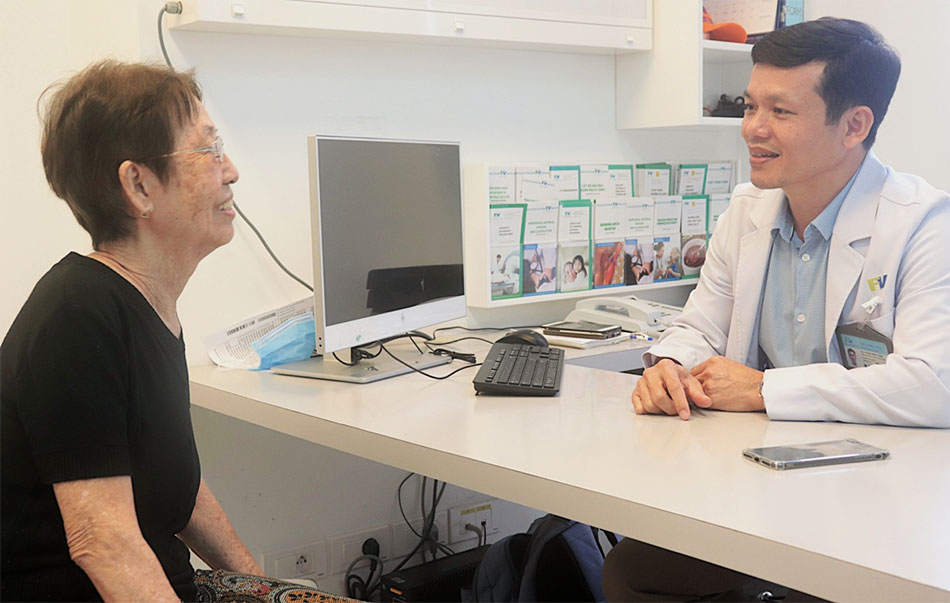Mrs V.T.P. (Chinese, 74, living in District 1, Ho Chi Minh City) developed rectal cancer but thought her symptoms were due to hemorrhoids. She had suffering from hemorrhoids for 50 years and never visited a hospital for care. Once Mrs P.’s disease was accurately diagnosed, she was brought to many hospitals for treatment by her children.
“Are these symptoms complications of hemorrhoids?”
Around the end of 2019, Mrs P. was suffering from bloody stools after eating. She thought this was “probably due to complications of hemorrhoids”.
Two weeks later, she was taken by her children to a clinic in District 1, where a doctor prescribed a medicine for her to drink. Mrs P’s symptoms did not improve.

She continued to go to another clinic near her home for an endoscopy, where her doctor discovered she had a large, life-threatening tumour in the rectum. This doctor advised her to go to a specialist hospital urgently.
As diagnosed, the biopsy results of a large hospital in Ho Chi Minh City confirmed Mrs P. had a rectal cancer unrelated to hemorrhoids, and needed urgent surgery which may have resulted in surgeons having to remove her anus.
Her children were worried that because that their elderly mother is weak, learning the severity of her condition might cause her mental anguish. They decided to conceal the fact that Mrs P. has rectal cancer, telling her only that she has a benign tumour in her rectum which required surgery.
Dr Phan Van Thai, Head of General Surgery at FV Hospital, discovered through examination, testing and diagnosis of Mrs P. that her cancer was very low down in her rectum, near the anus.
“It was a malignant stage three rectal tumour, as large as a lemon that was invasive outward,” says Dr Thai.
“Most cases will have the indication to remove the anus and open the colon to the skin of the abdomen permanently, where waste would be collected by a colostomy bag. Instead, I used a technique to accurately measure the tumour margin and apply preoperative radiotherapy followed by a complex surgery to treat the patient’s cancer while retaining the natural excretory function. In this manner, the patient could enjoy a quality of life in the future,” Dr Thai continues.
When Dr Thai said that it was necessary for Mrs P. to undergo two operations, the first to remove the disease and install a temporary artificial anus, followed by a second surgery a few weeks later to close the artificial anus, Mrs P. refused to undergo surgery. However, after urging from her family to receive treatment, Mrs P. agreed.
Remove the malignant tumour, keep the anus
Due to the large size of her tumour, it has invaded but her family was adamant that Mrs P.’s anus be retained. Before the operation, Dr Thai consulted with other FV physicians, ultimately conducting radiotherapy to blanket and destroy the tumour before removing the cancerous tissue, importantly increasing the possibility that the patient’s anus could be retained.
Due to to the highly accurate VMAT radiotherapy technique employed by Dr Thai, 90 per cent of Mrs P.’s anus could be retained.
A few days after radiotherapy, Mrs P. underwent the first laparoscopy to remove the damaged section of her rectum and part of the sphincter in her anus. It took five hours for her surgeons to stitch her colon to the anal canal. During this operation, Dr Thai opened a temporary artificial anus for the patient to avoid any leakage.
“Because the tumour penetrated deep into the patient’s healthy tissues, the laparoscopy process from the abdomen needs to dig deep into the anal canal. This means that the surgeon must operate in a specific layer of tissue: if the thin envelope around the rectum is torn, there’s a risk of tumour cells being transferred elsewhere; there’s also a risk of damage to important blood vessels,” explains Dr Thai.
“The surgery of anal canal and incision into the anal sphincter must be meticulous and extremely accurate to ensure that the cross section is far enough away from the tumour to ensure all tumor cells are removed, while also not damaging the anus to ensure good function after surgery,” Dr Thai continues.
Although elderly, Mrs. P. recovered quickly, without experiencing any pain after surgery. Dr Thai discharged her to rest for two weeks at home before Mrs P returned to the hospital for a second, simpler surgery to close her artificial anus.
Mrs P. also recovered quickly after her second operation.
After several follow ups, Mrs P. and her daughter Ms Chau could not disguise their pleasure when Dr Thai informed them that Mrs P.’s health was getting better, with no sign of the tumour recurring.
The number of times Mrs P. needs to evacuate stool has also reduced, from 10 times a day to one to three times a day.
Mrs P. practices physical therapy every day according to her care providers’ instructions to aid her recovery.
TUOI TRE NEWSPAPER SOURCES



